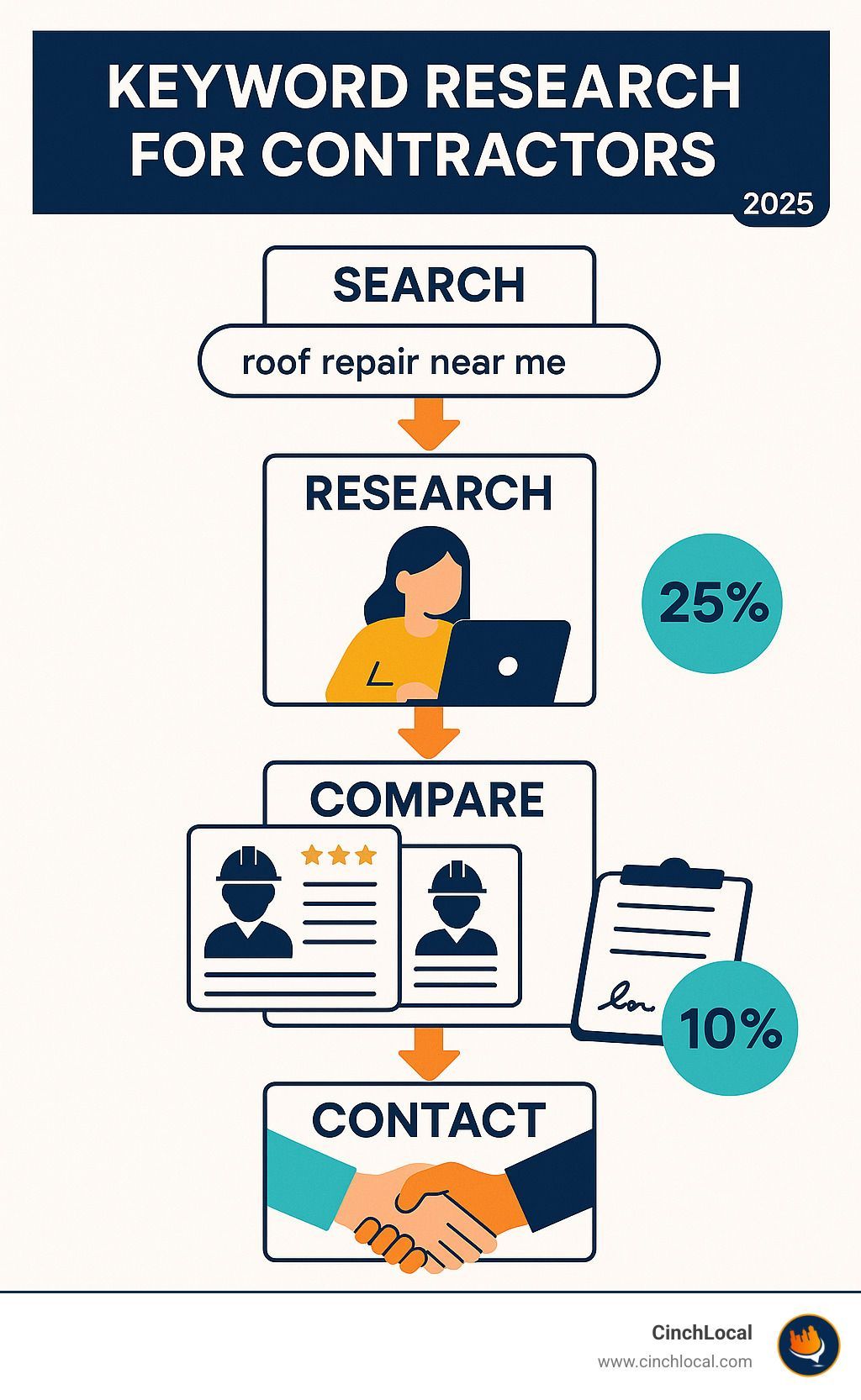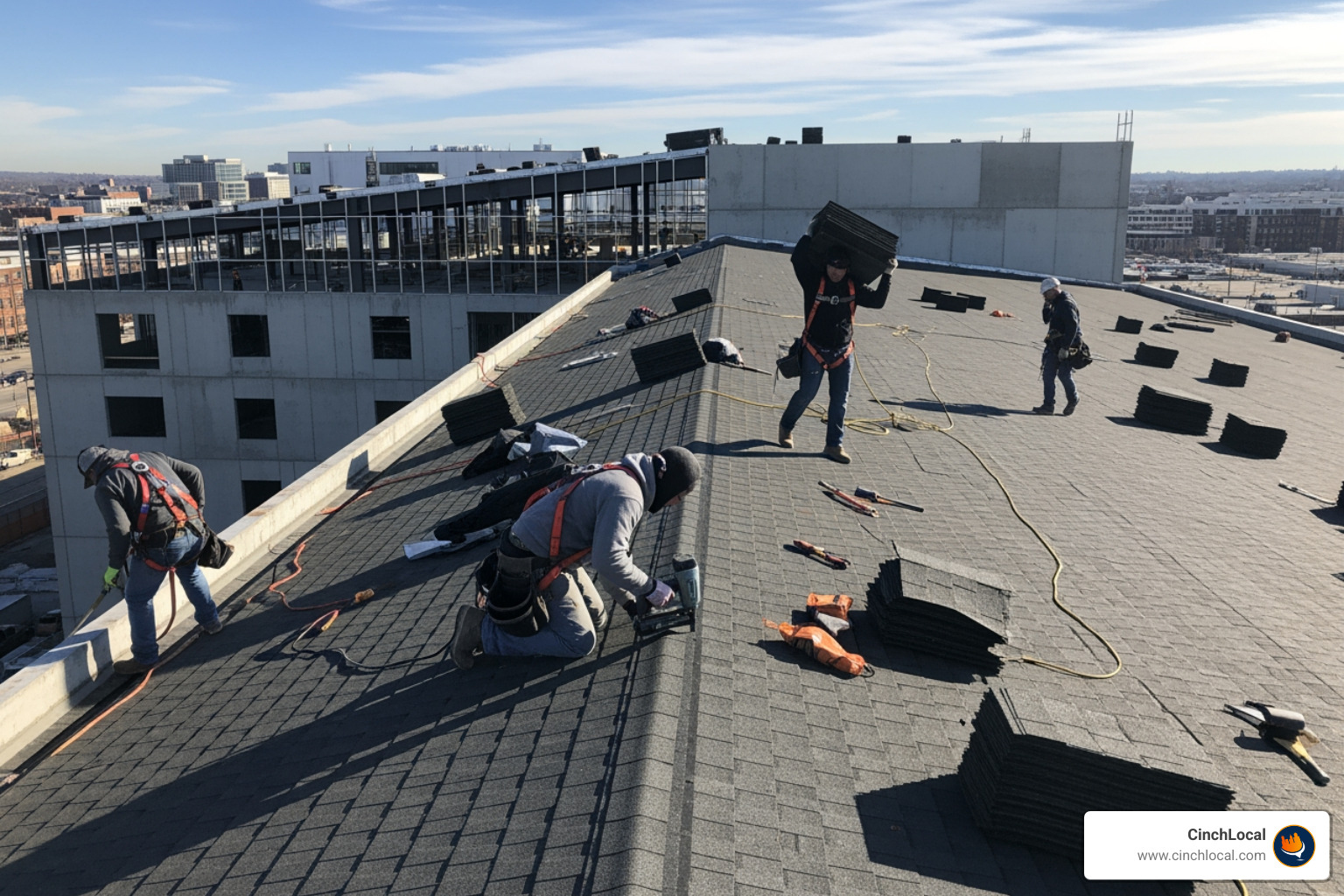
Cary Byrd // Founder of CinchLocal
Why Keywords are the Blueprint for Your Online Success

Keyword research for roofing contractors is the foundation of getting found online by customers who need your services. If you want to turn those searches into profitable projects, start by learning from the contractor marketing experts at CinchLocal. Here's what you need to know:
Essential Steps for Roofer Keyword Research:
- Start with your services – List what you actually do (roof repair, roof replacement, storm damage assessment, shingle installation)
- Think like your customers – What would they type into Google when they need your help?
- Use free tools – Google Keyword Planner shows you search volume and competition
- Focus on "near me" terms – Local searches like "roofer near me" are gold for contractors
- Target buyer intent – Keywords like "hire roofer" convert better than "what is a hip roof"
Today, 99% of consumers start their search for local companies online. If your roofing business isn't visible on the first page of Google, you're literally handing jobs to your competition. The difference between roofers who struggle for leads and those with packed schedules often comes down to one thing: understanding what their customers are actually searching for.
This is where a solid roofing contractor SEO strategy becomes your most valuable marketing tool. Think of keyword research as the blueprint for your online success – it guides potential customers directly from their Google search to your phone line, turning online searches into profitable projects.
I'm Cary Byrd, and over the past decade building marketing systems for roofing contractors, I've seen how the right keyword research for roofers can transform a struggling business into a lead-generating machine. My experience helping roofers dominate their local markets has taught me that success starts with understanding exactly what your customers are typing into Google.

Essential keyword research terms:
- Roofing contractor digital marketing
- Local SEO for roofers
- Web design for roofing company
Understanding the Language of Your Customers: Keyword Types Explained
Imagine a homeowner sipping coffee and muttering, “I need someone to fix this leaky roof.” That casual phrase is exactly what they’ll type into Google. Keyword research for roofers means capturing that real-world language—then matching your pages to the intent behind each search.

Short-Tail vs. Long-Tail Keywords
- Short-tail keywords (e.g., “roofer” or “roofing”) bring large search volume but brutal competition and vague intent.
- Long-tail keywords (e.g., “affordable roof repair in Dallas”) have lower volume but far higher conversion rates because searchers already know what they want.
HubSpot’s research confirms that specific, problem-focused phrases turn browsers into buyers—perfect for local roofers.
Search Intent: The “Why” Behind the Search
- Informational – “How much does a new roof cost?” Great for blog guides that build trust.
- Commercial – “Best roofing contractors near me.” Ideal for service pages loaded with proof and reviews.
- Transactional – “Hire emergency roof repair now.” Send these visitors straight to a contact form.
- Navigational – “CinchLocal reviews.” Make sure your brand pages rank for your own name.
Matching content to intent ensures every visitor lands on a page that answers their exact need, improving both rankings and conversion.
The Ultimate 5-Step Guide to Keyword Research for Contractors

Below is a streamlined process we use to help roofing contractors in Ohio, Tennessee, Georgia and California dominate local search—without drowning in data.
Step 1: Brainstorm Seed Keywords
List services and pain points in plain language: “roof leak fix,” “storm damage repair,” “new roof installation,” “shingle replacement.” Capture urgent searches, replacement needs, and common cost questions.
Step 2: Expand with Research Tools
Use free options like Google Keyword Planner or premium suites such as Ahrefs. Focus on three metrics:
- Search volume – how many monthly searches?
- Keyword difficulty – how tough is first-page placement?
- CPC – higher ad cost = higher buyer intent.
A term like “roof repair contractor Nashville” (210 searches, low difficulty) often beats “roofer” (49,500 searches, high difficulty) because it connects you with ready-to-hire locals.
Step 3: Analyze Competitors
Identify who already ranks on page one—local firms, national chains, even Home Depot blog posts. Run their domains through a tool such as SEMrush’s Keyword Gap report to uncover phrases they rank for but you don’t. Those are quick wins.
Step 4: Map & Prioritize
Assign the strongest keyword to one page only, preventing internal cannibalization. For example:
- Homepage – “roofing contractor [city] ” (commercial intent)
- Service page – “storm damage roof repair [city] ” (commercial/transactional)
- Blog – “average cost of a new roof” (informational)
Prioritize by potential revenue, ranking difficulty and relevance.
Step 5: Go Local—Own the “Near Me” Search
“Near me” queries are up more than 200 % in recent years. Cover variations: “roof repair near me,” “shingle repair in Franklin TN,” “roof inspection 37209.” Optimize your Google Business Profile and embed clear NAP (Name, Address, Phone) info site-wide so Google can confidently surface you in the local pack.
Putting Your Keywords to Work: On-Page SEO for Contractors
Having great keywords is only half the battle. The other half is using them effectively on your website. This is where many roofers drop the ball - they stuff keywords awkwardly into their content, making it sound robotic and spammy.
Think of it this way: your keyword research for contractors is like having the perfect blueprint, but if you don't execute the construction properly, the whole project falls apart. The same principle applies to your website content.
Weaving Keywords into Your Website Content
The secret to successful on-page SEO isn't cramming keywords everywhere - it's about making them feel natural and helpful. When someone lands on your page, they should immediately understand what you do and how you can help them.
Start strong with your primary keyword placement. Use your main keyword in the first 100 words of your page, but make it sound conversational. Instead of "Our roof repair services provide roof repair solutions for roof repair needs," try "When you're ready to protect your home, our expert roofing team brings decades of experience to every project."
Your H1 header should include your primary keyword, but remember - real people read these headers too. "Professional Roof Replacement in Dallas" works much better than "Roofing Dallas Roof Repair Dallas."
LSI keywords and variations are your secret weapon for sounding natural while covering more search terms. Google understands that "roof repair," "roof replacement," "shingle repair," and "roofing services" are all related concepts. Use this to your advantage by mixing these terms naturally throughout your content.
Tools like LSIGraph can help you find related terms, but honestly, your own industry knowledge is often the best guide. You know that customers might call it a "roof fix" while you prefer "roof repair" - use both terms naturally in your content.
Readability always comes first. Google's algorithm is smart enough to detect keyword stuffing, and it will penalize your site for it. More importantly, your potential customers will bounce from your site if the content sounds robotic. Write for humans first, search engines second.
Optimizing Key On-Page Elements for your keyword research for contractors
Your website's HTML elements are like the framework of a house - they need to be solid and properly structured to support everything else.
Title tags are often the first impression you make in search results. They should include your primary keyword and be compelling enough to earn the click. Keep them under 60 characters to avoid getting cut off in search results.
Here's what works: "Roofing Services in Nashville | Storm Damage Repair & Free Estimates"
Here's what doesn't: "Roofing Nashville Roof Repair Nashville Roof Replacement Nashville"
Meta descriptions don't directly impact your rankings, but they absolutely influence whether people click on your listing. Think of them as your elevator pitch in search results. Use your primary keyword naturally and include a clear call-to-action that tells people what to expect.
For example: "Protect your home with our expert roofing services in Nashville. We handle storm damage, replacements, and offer free estimates. Call today!"
Headers structure your content like the rooms in a house - they help both readers and search engines steer your information. Your H1 should include your primary keyword, while H2 and H3 tags can incorporate secondary keywords and related terms. This creates a logical hierarchy that makes your content easy to scan and understand.
Image alt text is often overlooked, but it's crucial for both accessibility and SEO. Instead of leaving images labeled "image1.jpg," use descriptive alt text like "asphalt shingle roof replacement on a modern Nashville home." This helps search engines understand your images and improves your site's accessibility.
For more detailed guidance on these elements, check out resources on effective title tags , using headers for structure , and writing descriptive alt text.
The key is making everything work together seamlessly. When your keywords, content, and technical elements align, you create a user experience that both Google and your customers will love.
Best Practices for Effective Keyword Targeting
Even with the best keyword research for contractors , it's surprisingly easy to sabotage your own efforts. I've watched roofers spend months creating great content only to see it fail because of a few critical mistakes. The good news? These pitfalls are completely avoidable once you know what to look for.
Avoiding Common Pitfalls
The biggest mistake I see contractors make is keyword stuffing - cramming their target keyword into every possible sentence. It's like that overeager salesperson who mentions their company name in every breath. Google's algorithms are sophisticated enough to spot this from a mile away, and they'll penalize your site for it.
Here's what keyword stuffing looks like: "Our Nashville roofing company provides Nashville roofing services for Nashville homeowners seeking Nashville roofing solutions." It sounds robotic and desperate, doesn't it?
Instead, try this natural approach: "Our Nashville roofing company specializes in durable roof replacements for local homeowners. From inspection to installation, we handle every aspect of protecting your home." Same message, but it actually sounds like a human wrote it.
Another common trap is targeting irrelevant keywords just because they have high search volume. "Home improvement" gets searched 100,000 times per month, but if you only do roofing, you're wasting your time. Those visitors will bounce faster than a rubber ball because you're not what they're looking for.
The third mistake is ignoring user intent . When someone searches "how to fix a missing shingle," they want a DIY guide, not a sales pitch. Give them the helpful information they're seeking, then subtly mention your services for complex projects. This builds trust and positions you as the expert they'll call when they're ready to hire a professional.
How to monitor and adapt your keyword research for contractors
Keyword research for roofers isn't something you do once and forget about. Markets shift, new competitors emerge, and customer language evolves. I've seen roofers lose their top rankings because they got complacent and stopped monitoring their performance.
The key is setting up a monthly rhythm for checking your progress. Log into Google Search Console and see what keywords are actually driving traffic to your site. Sometimes you'll find you're ranking for terms you never even targeted - these are goldmines for future content.
Your quarterly deep dives should be more comprehensive. This is when you analyze what your competitors are doing, update your keyword mapping, and identify seasonal trends. For example, roofing keywords spike after major storms, while "roof inspection" searches peak in early spring when homeowners start planning for the year.
Pay attention to the metrics that actually matter : organic traffic growth, keyword ranking positions, and most importantly, conversion rates from organic traffic. You can rank #1 for a keyword, but if it doesn't bring qualified leads, it's not helping your business.
Don't forget about seasonality in the contractor world. Roofers see "ice dam removal" spike in winter, while "storm damage repair" searches peak after hail season. Plan your content calendar around these predictable patterns, and you'll capture customers exactly when they need your services.
Google Analytics and Google Search Console are your best friends for tracking progress. These free tools provide invaluable insights into how your keyword strategy is performing and where you should focus your efforts next.

Frequently Asked Questions about Keyword Research for Contractors
How often should I update my keyword list?
Run a quick check in Google Search Console every month and perform a deeper refresh each quarter. Season-specific services—storm damage repair, roof inspections, ice dam removal—warrant extra attention a few months before demand spikes.
What keyword difficulty should I chase first?
If your site is new, stick to terms with a difficulty score below 30 until you’ve built authority. As backlinks and reviews grow, gradually tackle harder phrases with larger search volume.
Can I write about services I don’t sell?
Yes—on your blog. Share DIY tips or maintenance advice for related projects. Helpful content builds trust and keeps you top-of-mind for bigger jobs that do fit your wheelhouse.
How do I beat giant national brands?
Lean into geography and expertise. Target phrases like “asphalt shingle roofer in Upper Arlington” or “storm-damage roof repair Alpharetta.” National firms struggle to localize at that granularity.
Low search volume equals low value, right?
Not necessarily. Fifty highly qualified searches that convert at 10 % can out-earn 500 casual visits that convert at 1 %. Focus on intent over volume.
Conclusion: Build a Stronger Business with a Solid Keyword Foundation
Keyword research is the load-bearing wall of your digital marketing strategy. By understanding how homeowners actually describe their problems—and aligning each page to that language—you create a direct bridge between search and solution.
From brainstorming seed terms to mapping local, high-intent phrases, the steps in this guide give you a repeatable system for steady, qualified traffic. The payoff is simple: more calls, more estimates, and more projects on the calendar.
Want a partner who has already built this system for roofing contractors nationwide? The team at CinchLocal is ready to help you turn keywords into revenue. Reach out today and see how fast the right words can fill your pipeline.
Want Us to Uncover Hidden 'Footprint Gaps' And Critical Blind Spots That’s Quietly Draining Calls, Jobs, and Profits?
Simply Fill Out The Form Below:








